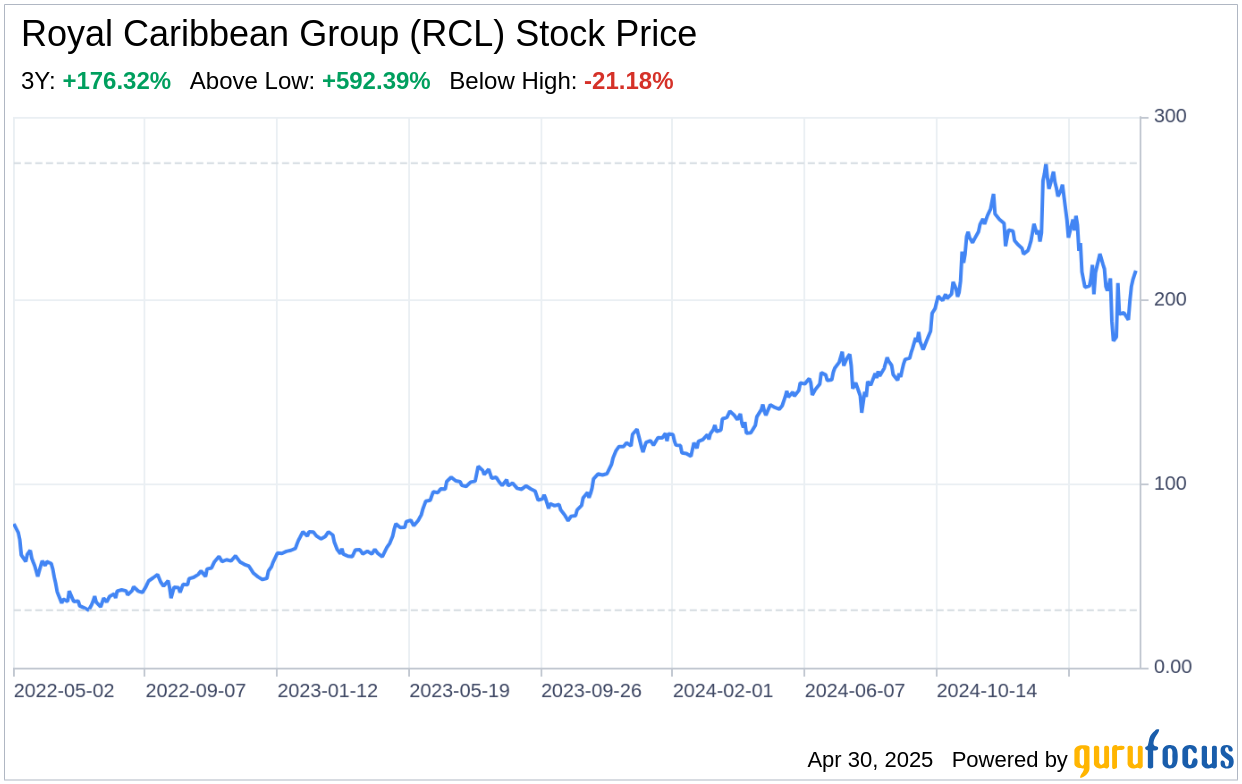Royal Caribbean Group (RCL, Financial), the world's second-largest cruise company, has recently filed its 10-Q report for the quarter ended March 31, 2025. The company has shown a remarkable financial performance with total revenues climbing to $3.999 billion from $3.728 billion in the previous year, marking a substantial increase. Net income attributable to Royal Caribbean Cruises Ltd. has soared to $730 million, doubling from $360 million in the prior year. This financial overview indicates a strong fiscal position, with earnings per share (EPS) rising from $1.35 to $2.70. The company's operational efficiency is reflected in its ability to manage cruise operating expenses and marketing, selling, and administrative expenses effectively, despite the increase in capacity and delivery of new ships. With a solid balance sheet and strategic initiatives in place, RCL is poised for future growth, although it must navigate the complexities of market risks and debt covenants.

Strengths
Brand Power and Market Position: Royal Caribbean Group's brand strength is a significant asset. As the second-largest cruise operator globally, RCL has a diversified portfolio of brands, including Royal Caribbean International, Celebrity Cruises, and Silversea, which cater to various market segments. The company's market position is bolstered by its innovative ship designs, quality of service, and variety of itineraries, which have helped it to maintain a loyal customer base. The recent financials reflect this strength, with passenger ticket revenues increasing by $202 million, indicative of strong demand and pricing power.
Financial Resilience: RCL's financial resilience is evident from its latest 10-Q filing. The company has effectively managed its operating expenses, with total cruise operating expenses only marginally increasing despite higher capacity. This control over costs, coupled with revenue growth, has resulted in a robust operating income of $945 million, up from $750 million in the previous year. Moreover, RCL's successful debt refinancing efforts have reduced interest expense, net of interest capitalized, by $175 million, further strengthening its financial standing.
Innovation and Fleet Expansion: Royal Caribbean Group's commitment to innovation and fleet expansion is a testament to its strength. The company has introduced new ships, such as Utopia of the Seas and Silver Ray, contributing to a 3.0% capacity growth. This expansion strategy not only enhances RCL's ability to offer new and exciting experiences to its customers but also positions the company for long-term growth. The planned launch of the Celebrity River Cruise brand in 2027 further underscores RCL's forward-thinking approach.
Weaknesses
Debt and Financial Obligations: While RCL's financial performance is strong, the company carries a significant amount of debt. As of March 31, 2025, RCL reported total debt proceeds of $480 million and repayments of debt amounting to $1.221 billion. The need to manage this debt effectively is crucial, as failure to do so could impact the company's liquidity and financial flexibility. Additionally, the company's credit facilities and certain agreements contain covenants that could limit its operational freedom.
Dependence on Economic Conditions: The cruise industry is highly sensitive to economic conditions, and RCL is no exception. Consumer discretionary spending directly affects cruise bookings, and any economic downturn could lead to a decrease in demand for cruise vacations. This vulnerability is a weakness that RCL must continually address through strategic pricing and marketing initiatives.
Operational Risks: Operating a global cruise line involves various risks, including geopolitical tensions, health pandemics, and environmental regulations. These factors can disrupt operations and result in increased costs or reduced revenues. For instance, the COVID-19 pandemic had a profound impact on the cruise industry, and while RCL has recovered, the potential for future disruptions remains a weakness.
Opportunities
Emerging Markets and Demographics: Royal Caribbean Group has the opportunity to tap into emerging markets and changing demographics. With a growing middle class in regions like Asia and an aging population in Western countries, RCL can expand its customer base by offering tailored experiences that cater to these diverse groups. The company's global presence and brand recognition position it well to capitalize on these demographic shifts.
Technological Advancements: The adoption of new technologies presents an opportunity for RCL to enhance the customer experience and improve operational efficiency. Innovations in digital booking systems, onboard amenities, and sustainable technologies can differentiate RCL from its competitors and attract environmentally conscious travelers.
Strategic Partnerships and Acquisitions: RCL's history of successful partnerships and acquisitions provides a roadmap for future growth. Strategic alliances with travel agencies, destination ports, and other service providers can create synergies and open new revenue streams. Additionally, acquiring or investing in complementary businesses can expand RCL's market reach and service offerings.
Threats
Competitive Industry Landscape: The cruise industry is highly competitive, with several major players vying for market share. RCL faces competition from other cruise lines that may offer similar itineraries or lower prices. To maintain its competitive edge, RCL must continue to innovate and provide exceptional value to its customers.
Regulatory and Environmental Challenges: RCL operates in a regulatory environment that is subject to change. New regulations related to environmental protection, safety, and labor can increase operating costs and require significant capital expenditures. The company must stay ahead of these regulatory changes to ensure compliance and avoid potential fines or operational disruptions.
Global Economic and Political Uncertainties: Economic downturns, political unrest,
This article, generated by GuruFocus, is designed to provide general insights and is not tailored financial advice. Our commentary is rooted in historical data and analyst projections, utilizing an impartial methodology, and is not intended to serve as specific investment guidance. It does not formulate a recommendation to purchase or divest any stock and does not consider individual investment objectives or financial circumstances. Our objective is to deliver long-term, fundamental data-driven analysis. Be aware that our analysis might not incorporate the most recent, price-sensitive company announcements or qualitative information. GuruFocus holds no position in the stocks mentioned herein.
